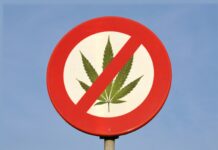
Researchers in Canada have determined that the city of Halifax consumes the most cannabis per capita out of five major urban areas in the country. The study by Statistics Canada, the national statistics agency, analyzed wastewater from 15 sewage treatment plants serving Halifax, Montreal, Toronto, Edmonton, and Vancouver to determine average cannabis use per person in the cities. More than 8 million Canadians live in the areas surveyed for the study.
New Research Tool
The technology used in the study, known as wastewater-based epidemiology, has been used in Europe since 2007 to track drug consumption in large cities. The current pilot study by Statistics Canada is the first use of the technology in that country.
“Statistics Canada is still exploring the benefits and limits of using WBE to produce statistics on drug use,” the agency wrote in a report about the research released last week.
Researchers analyzed wastewater samples from the five urban areas to determine the levels of a cannabis metabolite known as THC-COOH. The results of the study suggest that between March and August of this year Halifax had the highest consumption of cannabis per person per week at 1,310 micrograms. Montreal had the second-highest level at 976 micrograms per person per week. The figure for Toronto was 451 micrograms, Edmonton had 416, and Vancouver consumed 288 micrograms. Overall, Canadians in the research areas consumed cannabis at a rate of 540 micrograms per person per week.
Statistics Canada said that the results were “preliminary and experimental” and that large differences in monthly levels “may not necessarily reflect a true difference in consumption, but may be the result of sampling or statistical methodology.”
“Subsequent tests and results will allow the agency to better assess the long-term feasibility of using wastewater as an official data source,” the report noted.
The study was conducted in an attempt to determine if Canadians are under-reporting their use of cannabis due to the stigma associated with the drug. Inaccurate data about consumption can lead to difficulty in determining how much cannabis is being supplied by unregulated sources.
“One consequence of under-reporting is that the size of the black market for cannabis will be similarly underestimated,” the report states.
“As a result, without a direct measurement of cannabis consumption, the reduction of the black market for cannabis, one of the objectives of the legalization of non-medical cannabis, will be hard to track.”
The recreational use of cannabis was legalized in Canada in October. One of the stated goals of legalization was to limit the impact of criminal enterprises on cannabis supplies for the country.
Method Still Experimental
The Statistics Canada wastewater-based epidemiology pilot study is slated to continue through the spring of 2019. The agency will then determine if the technology will continue to be used.
“Statistics Canada is still exploring the benefits and limits of using WBE to produce statistics on drug use. Subsequent tests and results will allow the agency to better assess the long-term feasibility of using wastewater as an official data source,” notes the study.











